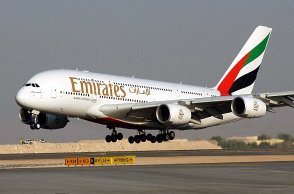Dubai, Apr 20: Emirates, the Middle East's biggest airline, today said it is cutting flights to the United States because of a drop in demand caused by heightened US security measures and Trump administration attempts to ban travellers from Muslim-majority nations.
The decision by the Dubai government-owned carrier is the strongest sign yet that tougher measures imposed on US-bound travellers from the Mideast are taking a financial toll on fast-growing Gulf carriers that have expanded rapidly in the United States in recent years. Dubai was one of 10 cities in Muslim-majority countries affected by a ban on laptops and other personal electronics in carry-on luggage aboard US-bound flights.
Emirates' hub at Dubai International Airport, the world's third busiest, is a major transit point for travelers who were affected by President Donald Trump's executive orders temporarily halting entry to citizens of six countries.
The latest travel ban suspended new visas for people from Iran, Libya, Somalia, Sudan, Syria and Yemen, and froze the nation's refugee program. Like an earlier ban that also included Iraqi citizens, it has been blocked from taking effect by the courts.
Emirates said the reductions will affect five of its 12 US destinations, starting next month. It called the move "a commercial decision in response to weakened travel demand" in the three months since Trump took office.
"The recent actions taken by the US government relating to the issuance of entry visas, heightened security vetting, and restrictions on electronic devices in aircraft cabins, have had a direct impact on consumer interest and demand for air travel into the US," the carrier said.
The cuts will reduce the number of US-bound flights from the carrier's Dubai hub to 101, down from 126 currently. Twice daily Emirates flights to Boston, Los Angles and Seattle will be reduced to once a day. Daily flights to Ft. Lauderdale and Orlando will be pared down to five per week.





Comments
Add new comment